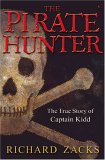Summary | Excerpt | Reviews | Readalikes | Genres & Themes | Author Bio

The True Story of Captain Kidd
by Richard Zacks
At the time of Gilliam's capture, the combined power of the Royal Navy, the English East India Company, and the governments of half a dozen American colonies were all conspiring to bring Captain Kidd of New York City and Dundee, Scotland, to the same gallows in the harbor. England, on the verge of Empire, planned to show the world what it would do to a man who dared to steal in the name of the king.
* * *
Captain Kidd has gone down in history as America's most ruthless buccaneer, fabulously rich, burying treasure up and down the eastern seaboard. I, for one, ten years old reading by flashlight, pictured Kidd fierce, mustachioed, downing rums, slicing the air with his cutlass, burying boys to guard his treasure for eternity.
Washington Irving described Kidd as "somewhat of a trader, something more of a smuggler with a considerable dash of the pickaroon." Robert Louis Stevenson placed "Kidd's Anchorage" on the creased vellum map of Treasure Island. Edgar Allan Poe in "The Gold Bug" rummaged through Kidd's chest: "As the rays of the lantern fell within the pit, there flashed upwards from a confused heap of gold and jewels, a glow and glare that absolutely dazzled our eyes." More recently, Nelson DeMille in his best-seller, Plum Island, used Kidd's hideout in the climax of his ecological thriller.
But the novelists and historians and relentless treasure hunters have gotten it all wrong. Master mariner William Kidd, who lived at 56 Wall Street, was no career cutthroat, no cartoon Blackbeard, terrifying his prey by putting flaming matches in his hair. Kidd was a reputable New York sea captain empowered by a secret commission from the king of England to hunt pirates, confiscate their wealth, and divvy the spoils among his investors. The venture looked so promising in the planning stages that some of the most powerful lords of London and wealthiest merchants of America lined up to back his voyage and await the shower of gold. King William III, in exchange for his signature, took a ten percent share.
But, as is the way with these clandestine missions, the whole plot blew up in their faces. Kidd's task turned out to be far more difficult than expected: He would have to travel in a lone ship manned by a desperate crew (which included pirates), searching the vast Indian Ocean for one of the five European pirate ships then active. He would have to ignore the claims of the merchants who owned the stolen goods. And as soon as he set out toward the tip of Africa, he would find himself unwelcome, distrusted by the Royal Navy and despised by the English East India Company, who almost immediately claimed that the pirate hunter had turned pirate. The great irony is that Captain Kidd fought very hard to remain honorable, but was branded by the actions of his crew, and on his head was dumped all the piracies of the era.
When rumors of Kidd's crimes began to spread, damaging England's valuable trade with India, Kidd's backers — including King William — all raced to cover their blueblood asses and disavow any knowledge of his mission. Did anyone want to know the truth? Or was it easier to kill the New Yorker and be done with it?
The doings of this feisty American unleashed an enormous political scandal that rocked the New World and the Old, and threatened to tip the subcontinent of India to the Maharajahs. If the accusations that the king backed a "Corporation of Pirates" were proven true, it could endanger King William's perch upon the throne, and could cost Kidd's lordly backers their lives for committing treason. These happenings are not fiction but real-life intrigue and double cross, based on the 152-page trial record, hundreds of letters, and depositions from the likes of John Gardiner of Gardiners Island, where Kidd actually hid some of his treasure during an attempt to clear his name.
I have spent the last three years tracking down the flesh-and-blood Captain Kidd, following the paper trail through logbooks and trial transcripts at the Public Record Office in London, and traveling in his wake to the faraway pirate paradise of St. Marie's Island off Madagascar.
Copyright (c) 2002 Richard Zacks
Your guide toexceptional books
BookBrowse seeks out and recommends the best in contemporary fiction and nonfiction—books that not only engage and entertain but also deepen our understanding of ourselves and the world around us.